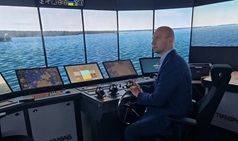
In stereotypes, research is carried out by a lone professor, mumbling in his "ivory tower", his hair white and messy. In reality, research requires close interaction with and between experts and stakeholders. This interaction takes place in meetings, seminars, and events, both face-to-face and online.
Life and business in the Baltic Sea countries depend on maritime transport. On a global scale, 15% of all goods are transported across the Baltic Sea region. Transport and operations in the logistics chain consume fuels and energy. The fuels used by most ships are still fossil, i.e. non-renewable. The combustion of fossil fuels produces carbon dioxide (CO2), which is the main greenhouse gas contributing to the climate crisis. The climate crisis has multiple impacts on the whole planet.
The Sustainable Flow (Sustainable flow of goods and decreased CO2 emissions of transportation) project reduces CO2 emissions in and around ports, focusing on activities in the Interreg Central Baltic region. The project involves seven different partners from Finland (including Åland), Estonia, Latvia, and Sweden. Research and solution development will be carried out in close cooperation with the seven pilot ports. The project will contribute to all three pillars of sustainable development: environment, economy, and social sustainability. This means that the solutions developed are not only environmentally friendly but can be implemented in a way that is economically reasonable to put into practice. The solutions also genuinely support the work and skills of the industry.
The Sustainable Flow project is developing three ways to reduce carbon emissions: digital tools for ships and port operations entering the port, energy saving measures, and renewable energy sources in ports. Results are achieved by close cooperation and communication between the different actors, which has already been very close: the partners have been communicating and working together since the conceptual phase of the project - now more than 1.5 years.
COVID-19 pandemic influenced the preparation of the project, as cooperation was only carried out via email and Teams. The partners met for the first time in Rauma during the first month of the project in May 2023. The focus of the meeting was to clarify the rules of funding and what to do in practice, but the agenda included visits to the pilot ports in Rauma and Pori and the social programme as well.
Did you know?
- The Sustainable Flow project is led by Satakunta University of Applied Sciences, Maritime Logistics Research Center.
- The Sustainable Flow project (duration 1.5.2023–31.5.2026) is funded by the Interreg Central Baltic programme with a total budget of 3.4 million euros.
- Sustainable Flow has seven pilot ports in Rauma, Pori, Mariehamn, Tallinn, Riga, Norrköping, and Oxelösund.
- Sustainable Flow aims to reduce carbon dioxide emissions in the pilot ports by 10%.
